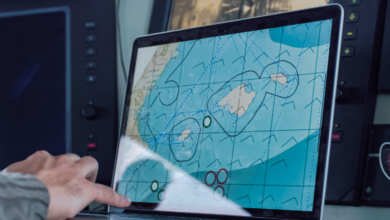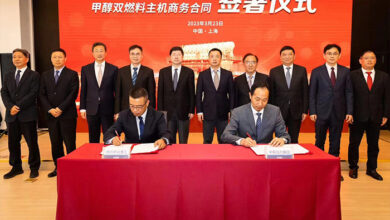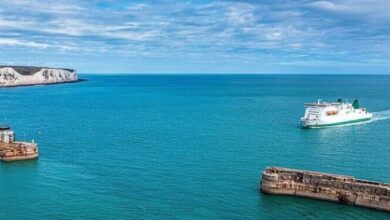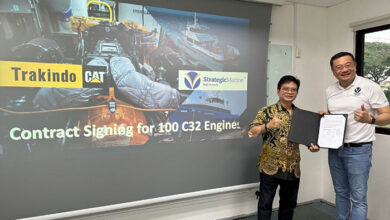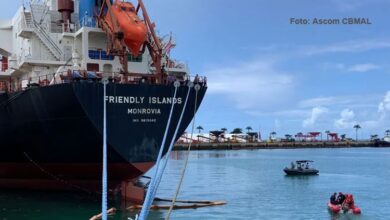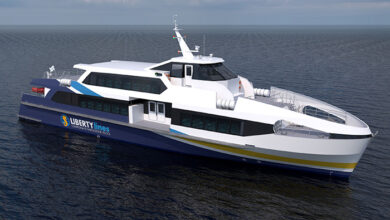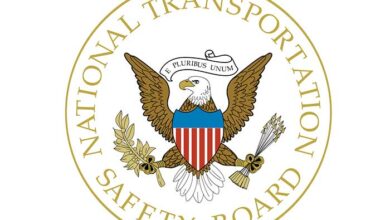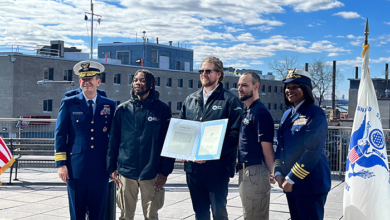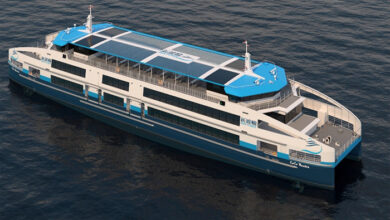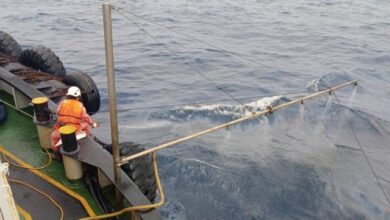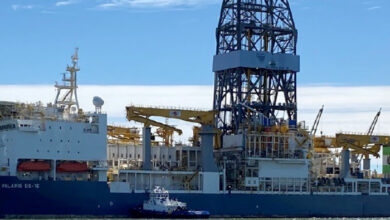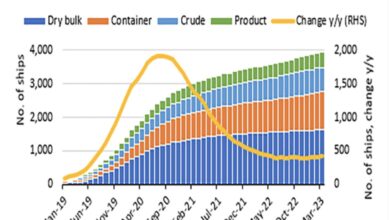HomeMarineNewsOrganisations
IWSA : Wind Propulsion Stakeholders Call for Concerted Action to Remove Remaining Barriers to Uptake
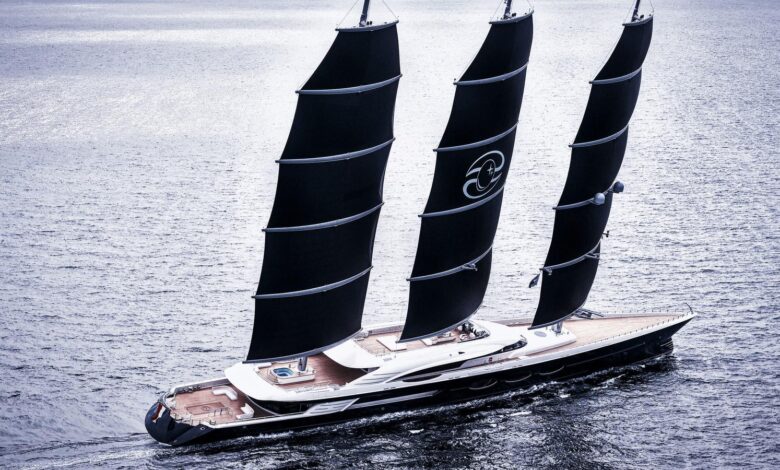
As the industry searches for technologies and energy sources that can deliver on upcoming decarbonization regulations from the IMO and EU and ultimately delivering zero-emissions shipping, the development and deployment of wind propulsion technologies have been making headlines that speak to a growing momentum.
Today sees the release of the report from a group of over 40 leading experts and key stakeholders that came together for a three-hour workshop to identify the strategic priorities for wind propulsion development in the near future, calling on industry stakeholders, technology providers, policymakers, finance, and the International Windship Association to work more closely together to reduce or eliminate the remaining barriers that continue to challenge the scaling of wind propulsion in commercial shipping. Download the report https://wind-ship.org/wp-content/uploads/2021/08/Wind-Propulsion-Strategy-Workshop-June-2021.pdf
This summary report is a call-to-action to facilitate the uptake of wind propulsion systems and will form the basis of the International Working Group that we will establish before the end of the year as part of the ‘Decade of Wind Propulsion’ announced earlier this year.” states the workshop convener and moderator, Gavin Allwright, Secretary-General of the International Windship, he adds; “All participants agreed that significant progress has been made, but there is still significant work required to secure trusted, third party verified information on the performance and operations for the market, access to sufficient capital for Wind Propulsion Technologies (WPT) development, especially full-scale demonstrators and the continued need to introduce and strengthen market and policy incentives to decarbonize vessels.”

The workshop and subsequent report used the 2016 EU-commissioned ‘study on the analysis of market potentials and market barriers for wind propulsion technologies for ships’ as the baseline to access progress and help to highlight areas for further development. The original report’s headline findings were; “Should some WPTs reach marketability in 2020, the max. the market potential for bulk carriers, tankers, and container vessels is estimated to be 3,700-10,700 installed systems until 2030, including both retrofits and installations on newbuilds, depending on the fuel price, speed of the vessels, and discount rate applied. [CO2 savings of 3.5-7.5 Mt CO2 in 2030 and 6,500-8,000 direct & 8,500-10,000 indirect jobs generated].”

Acknowledging that some WPT’s have already reached that milestone and that the major classification societies have issued comprehensive guidelines for the installation of wind-assist propulsion systems, it would seem the drive to standardize assessment and application is well underway and the EU forecast seems to be on track, with ten demonstrator vessels in operation by the end of 2020 and likely to double by the end of this year
Workshop participants however called on all key stakeholders to work more collaboratively on reducing or removing the final barriers holding back a technology segment that is available for scaling today. As Cathal Leigh-Doyle, Senior Associate, Stephenson Harwood LLP states; “The working group covered numerous important issues and in particular had extremely useful discussions about methods to increase wind propulsion technology information being shared across the sector between designers, fabricators, and potential end-users”.

From a shipowner and business perspective, Hélène Smidt, Maritime Innovation lead at the Royal Belgian Shipowners’ Association adds; “In order to fasten the uptake of any energy efficiency measure, commercial agreements need to be adjusted to reflect a more long-term agreement between shipowner/operator and charterer. In this way, both parties can benefit from the fuel reductions realized by the investments.”
The report is downloadable from https://wind-ship.org/wp-content/uploads/2021/08/Wind-Propulsion-Strategy-Workshop-June-2021.pdf and focuses on 12 remaining structural challenges in bringing wind propulsion technology to scale and the process identified over 40 solutions to base their recommendations for further action upon.
EU Commissioned Study on Wind Propulsion
Study on the analysis of market potentials and market barriers for wind propulsion technologies for ships. This study was used as the baseline to access progress and help to highlight areas for further development. This report was commissioned by EU DG Clima in 2016 with the results published in late 2016 and made publicly available in Jan 2017 and involved independent assessment headed by CE Delft and involved experts from the Tyndall Centre for Climate Change Research at Manchester University, Fraunhofer ISI, and Chalmers University of Technology.
Wind Propulsion Strategy Workshop (04 June 2021)
The workshop was broken down into three main subgroups, with one focusing on technical issues, one covering business, operations, and financial considerations, and the final one tackling policy, regulations, and other external matters.
To be able to get to the heart of the discussions quickly a traffic light system was adopted, and three main sessions were covered; the progress made in the past five years, solutions for removing the remaining barriers, and finally suggestions for stakeholder’s engagement, next steps, and the pathway forward. Download Report
Moderator: Gavin Allwright, Secretary-General (International Windship Association)

Participants: Octavi Sadó Garriga (Mærsk Mc-Kinney Møller Center for Zero Carbon Shipping), Andreea Mui (Sustainable Shipping Initiative), Lars Robert Pedersen (BIMCO), Frederik Schur Riis (Green Ship of the Future), Edwin Pang (RINA), Mihai Barcanescu (STEERER/Waterborne EU),
Hélène Smidt (Belgium Shipowners Association), Markus Lehne (BALance Technology Consulting) David Patraiko (The Nautical Institute), Dr. Ning Lin (Nord University), Joost Schot (MARIN), Dr. Vasileios Kosmas (KLU), Sofia Werner (SSPA), Dr.-Ing. Jochen Marzi (HSVA), Yuko Kikyo (“K”LINE),
Daniel Barcarolo (ABS) ,Martial Claudepierre (Bureau Veritas), Dr. Jonathan Koehler (Fraunhofer ISI), Marko Möller (Scandlines), Konstantinos Fakiolas (FINOCEAN), Andrew Irvin (Micronesian Centre for Sustainable Transport), Alistair Johnson (Dasivedo Design), Arne Brockstaedt (Becker Marine), Herbert Blumel (Becker Marine), Bertrand Charrier (Bertrand Charrier Consulting), Patrick Englebert (Propelwind), Rodrigo Azcueta (Cape Horn Engineering), Romain Grandsart (AYRO), Tuomas Riski (Norsepower), Stephanie Lesage (Airseas),
Ted Shergalis (Magnuss), Anouk Martin (Neoline), Nick Contopoulos (Anemoi), Florent Violain (e-Odyn/Association Windship), Lise Detrimont (Association Windship), Frank Nieuwenhuis (Econowind), Nico van der Kolk (BlueWasp), Giovanni Bordogna (Blue Wasp), Richard Jeppsson (Wallenius Marine), Mikael Razola (Wallenius Marine), Charlie Bogue (Wind+Wing), Orestis Schinas (HHx Blue),
Cathal Leigh-Doyle (Stephenson & Harwood), Manuel Fluck (Southern Spars) Richard Adams (Southern Spars), Claes Horndahl (Yara Marine Technologies), Mats Olsson (Yara Marine Technologies), Frank Berrens (Berrens Maritime), Ameet Nair (Azolla), Thys Nikkels (Dykstra Naval Architects), Amnon Asscher (Nayam Wings)




